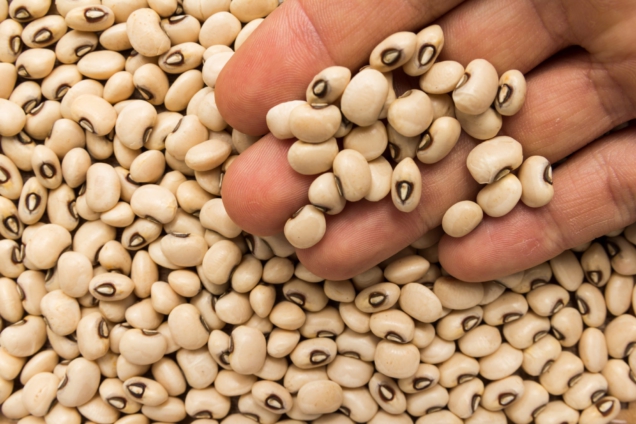Genetically Modified (GM) cowpea farmers in Nigeria say their decision to grow the variety is increasing their revenues from the farm.
The farmers say this is the result of improved productivity on their fields following reduced pest attacks, and less investment in pesticides.
Sharing his experience, 19-year-old farmer Osman Yahyah Alhassan who grows a 0.9-hectare cowpea field in the Tudun Wada Local Government Area in the Kano State said; “we got 17 bags with GM cowpea. On the same plot of land, we got only 9 to 11 bags previously.”
65-year-old farmer Dabo Umar who grows cowpea at Rurum in the Kano State has a similar experience.
He said he made additional N20,000 profits from his five acres of GM cowpea fields in 2020, compared to the money he made growing conventional seeds the year before.
“This cowpea, we farmed it this season, we made more money. Up to 20,000 Naira. This cowpea is better than any other cowpea. This is the best one…And many people are asking how we get this cowpea…No Maruca (pests). We are very happy about that,” Dabo – a father of 20 children and husband of two wives with 35 years of experience growing cowpea – explained.
Goma Lawal, a 54-year-old farmer with two wives and 20 children at Jaja in the Kaduna State says he has also seen his investment in pest protection reduce, following the decision to grow GMO cowpea seeds. This has left him with more resources to take care of his family.
"If you want to talk about money, we don’t spend too much money. Unlike the ordinary cowpea. The ordinary cowpea, we spend N2,000 to N3,000 on pesticides. This one, we don’t spend even up to N1,000,” he said.
Ahiaba M. Sylvanus, a 63-year-old smallholder farmer at the Malgoma-Sabongari local government area in the Kaduna State has a similar testimony.
He said when he grew conventional cowpea seeds, it cost him about N20,000 every season. But now he spends less than 500 Naira on pesticides and the variety is still productive.
“I spray less than the other ones we have been handling. And its early maturing and it comes in earlier…I got great relief…You’re having enough to eat. I was able to enjoy extra money from my labor,” he said.
Jamilu Mohammed Ahmed who grows cowpea and other crops at Mando in the Kaduna State also said, “the labor and the drudgery associated with the work” has reduced following the decision to grow GMO cowpea.
“I have been farming cowpea for the last 25 years. And I have not had any good experience as such of PBR. This will serve as an added advantage to serve as another alternative as a source of protein foods to both humans and livestock,” Ahmed added.
What exactly is Bt cowpea?
The Nigerian government in December 2019 approved the genetically modified cowpea variety known as Pod Borer Resistant Cowpea (PBR cowpea) or SAMPEA-20T for commercial production.
This allowed for some farmers across the country to have the opportunity to grow it unrestricted in late 2020.
Cowpea is a high protein orphan crop consumed by an estimated 200 million people in Africa daily. It’s usually cooked and eaten with carbohydrate sources like plantain and rice.
Nigeria is Africa’s largest producer and consumer of cowpea. But the country’s annual production deficit of cowpea grains stands at more than 500,000 metric tonnes.
Varied reasons are responsible for this including destruction caused to cowpea farms by the Maruca pod borer pest.
The pest can cause 100% yield loss in farmers’ fields. Bt cowpea results from the introduction of a gene from Bacillus thuringiensis (Bt) - a naturally occurring bacteria that have the capacity to control the pest - into local cowpea varieties. Nigeria is the first country in the world to commercialize Bt cowpea.
Prof. Mohammed Ishiyaku who is executive director of the Institute for Agricultural Research which developed the variety says farmers and the Nigerian economy will make a lot of money following the adoption of the variety.
“The productivity of this new variety, it has a yield potential of 2.9 tonnes per hectare. Whilst many of the other varieties have a potential yield of 1.9 to 2 tonnes per hectare.
“If 1 million hectares are planted, we estimate that Nigeria is bound to save more than N16 billion in terms of saving from insecticides alone…And a benefit of about 20% yield advantage, farmers are going to make the economic benefit of around N46 billion annually,” he said.
Latest Stories
-
Kounde strike wins Copa del Rey final for Barcelona
3 hours -
Is NPP crying more than the bereaved in the Chief Justice saga?
5 hours -
“Elements within NPP worked against me for supporting ‘Ken must go'” – Cynthia Morrison
5 hours -
IMF Boss commends finance minister for strong commitment to economic reform
6 hours -
Cynthia Morrison advises Ghanaian women to diversify their skills to build wealth
6 hours -
UK deports 43 immigration offenders to Ghana and Nigeria
6 hours -
Piwak Natural Health urges Akosombo victims to rebuild with new donation
7 hours -
Ghana’s Para athlete Gilbert Ampiah wins bronze at Marrakech Grand Prix 2025
7 hours -
6 dead in Adansi Dompoase crash involving VIP bus and sprinter
7 hours -
Saturday’s heavy rainstorm caused outages within our network – ECG
8 hours -
Police arrest 3 over gold robbery at Wassa Afransie
9 hours -
Against all odds: Zinabu Issah clinches silver for Ghana at WPA Marrakech 2025
10 hours -
ASFC 2025: Ghana girls complete host-and-win mission after beating Uganda
10 hours -
NPC President congratulates new GOC Executives
10 hours -
Stonebwoy displays maturity amid Aisha Modi’s attacks: a masterclass in brand integrity and respect
10 hours

